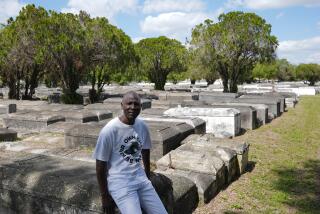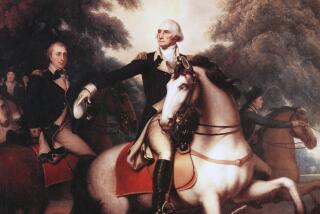In the Name of the (Founding) Father
As Washingtons go, Gregory noticed that Craig had a certain quality he’d never seen before in someone with his last name: white skin.
“I thought he was going to be black,” said Gregory, an African American, of his first meeting with new co-worker Craig Washington at Hughes Electronics in Torrance. “I told him he was the first white Washington I’d ever seen. I joked that we must be brothers.”
Greg’s assumption that Craig would probably be black was not ill-founded. According to the Census Bureau, 93% of people with the last name Washington are African American, the highest concentration of black people per surname.
“If I hear the name O’Brien, I’m going to guess the guy is probably Irish. If I hear the name Garcia, I’m going to guess they’re Hispanic,” said David Word of the Census Bureau. “And if I hear the name Washington, I’m going to guess the person is black. That’s just the way it is, but I have no idea why.”
Puzzlement over the origins of the last name Washington in the black community is not limited to the Census Bureau. Genealogists, historians and the vast majority of the estimated 116,000 African American Washingtons know frustratingly little about the ironic prevalence among blacks of the surname made famous by George, a Founding Father and plantation slaveholder.
“It’s especially difficult for African Americans to trace their ancestry,” said Edna Greene Medford, a history professor at Howard University in Washington, D.C. “Most slaves were not allowed to have last names. They didn’t count enough to have one.”
Clues to answer the Washington genealogical question date to the American Civil War. The North’s victory finally empowered the government to abolish slavery in 1865. The passage of the 13th Amendment freed some 4 million slaves--a majority of whom either had no last name or were eager to rid themselves of their former owner’s surname.
The first few years following emancipation marked an intense period in which former slaves chose their last names, according to historians. And for reasons still debated, Washington emerged as a popular choice.
Some historians contend that the former slaves--deliberately kept uneducated--were unaware that George Washington personally owned about 130 slaves. Former slaves knew only that the Washington name was well-known and available, say these historians.
“People felt that if the name was associated with a famous person, perhaps it would rub off on them,” said Medford, who teaches courses about the 19th century South. “It’s doubtful whether they knew [Washington] was a slaveholder, but they would have certainly known he was the first president.”
Other historians assert that many former slaves adopted the Washington last name as a form of political protest. They hoped the famed surname would simultaneously create a new American identity for them and also pique the nation’s moral conscience.
“Of course, [former slaves] knew Washington was a slaveholder,” said James Oliver Horton, an American studies professor at George Washington University in Washington, D.C. “They wanted to force America to face up to the differences in its rhetoric and its reality.”
Ultimately, however, slaves may have taken the Washington name to pay tribute to the founder of the Union that crushed the slaveholding Confederacy. Indeed, many former slaves assumed the surnames of Thomas Jefferson and Andrew Jackson for the same reason, argued historian Jack Warren of the University of Virginia. Former slaves were aware of Washington’s extensive slaveholding but felt the wealthy Virginian redeemed himself by setting his slaves free upon his death in 1799, Warren said.
Interestingly, few, if any, of Washington’s freed slaves retained the name Washington, according to Howard University’s Medford. She was able to trace about a quarter of Washington’s former slaves and found that none of them claimed the surname.
“He was said to have been as humane to his slaves as he could have been,” Medford said. “But slavery is slavery. No matter how kind a master he was, he was still preventing them from being human.”
In light of allegations that the third president, Thomas Jefferson, sired children both white and black, it must be said that the same suspicions do not surround George Washington. None of America’s black--or white--Washingtons are direct descendants. He may be the father of our country, but Washington had no children and, according to historians, was probably sterile.
But most black Washingtons today can only speculate about their family’s inheritance of the venerable surname. Edwin Washington Jr., who has been researching his family’s past for two decades, still can’t pinpoint when the last name was acquired. In a rare success for many African Americans, Edwin was able to trace his line to 1829, when his great-great-grandfather, Henry Washington, was born in Virginia.
“I still don’t know how he picked up the name,” said Edwin, 60, a systems programmer for Boeing Co. “But at some point, somebody did because it’s sure not an African name.”
Because of a paucity of Civil War-era records, many black Washingtons are forced to cling to mostly unreliable oral histories about their more distant family background. Laurence Washington, 42, says his great-aunt often told the story that his great-great-grandfather was a slave on a Georgia plantation.
“But I know that’s just old folks trying to remember,” said Laurence, a music writer in Boulder, Colo. “I wish somebody had the documentation.”
So does Gregory Washington, 39, a corporate investigator for Hughes Electronics. The Washington side of his family hails from Virginia, and family lore has it that one may have been a slave on the Mount Vernon plantation.
“But we’re not really sure,” Gregory said. “It’s pretty sketchy.”
In addition to traditional record routes, many Washingtons--white and black--are trying to fill in the branches of their family trees by tapping into the Internet. In hopes of reaching a long lost family member, Laurence Washington signed a guest book on a page maintained by Craig Washington--who is linked to George Washington’s family in England, but not the United States branch. (The site is https://members.aol.com/washpage/.)
“I was hoping someone would recognize my grandfather’s name,” said Laurence, who posted his information about a year ago. “But I still haven’t heard yet.”
The Web site, which displays a photo of Craig Washington of Palos Verdes Peninsula, surprised more than a few of the Washingtons who visited.
Said Laurence: “I’m 42 years old, and I’ve moved all over the country, and I’ve never met a white Washington. I’ve only heard about them in song and story.”
But perhaps no one was as astonished by the Web site as John Washington.
“It blew me away,” said the 52-year-old Burbank resident. “I thought I was the only white Washington in Southern California.”
More to Read
Sign up for Essential California
The most important California stories and recommendations in your inbox every morning.
You may occasionally receive promotional content from the Los Angeles Times.










